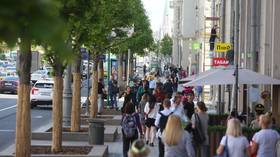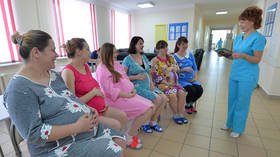Kremlin warns of ‘difficult’ demographic situation

Russia is facing a “difficult” demographic situation as it has yet to heal the scars left by World War II and the economic crisis of the 1990s, presidential spokesman Dmitry Peskov told journalists on Friday. The government has already introduced a number of measures to encourage childbirth, but they have not yet had the desired effect, he acknowledged.
“There are issues, which are irreducible in nature: those are the demographic pitfalls… linked to the Great Patriotic War… and the 1990s,” Peskov said, referring to the war between the USSR and Nazi Germany, as well as the severe economic crisis in Russia that followed the collapse of the Soviet Union.
Total Soviet fatalities in World War II amounted to 26.6 million people, according to the Russian Defense Ministry.
“We are now living through a decade when the [echoes] of these two pitfalls have combined. This is our historical hangover that still haunts us,” Peskov explained. The Kremlin spokesman said the government has introduced some “effective” measures to remedy the situation, including special subsidies to women who decide to have children.
A mother receives a grant amounting to 587,000 rubles ($7,346) when her first child is born and an additional 775,600 rubles ($9,706) if she gives birth a second time, according to the Russian State Duma. Low-income families with children receive additional financial aid from the state, Peskov said.
According to Peskov, the existing measures “have not produced a desired effect” and so “new measures are required.” Peskov did not elaborate on the exact measures the Russian authorities plan to take in this regard, adding that the government is still working on the matter.
“There is no panacea, no magic pill here,” Peskov said, adding that this will be a difficult and “long-term” effort. He also called the demographic situation “one of the major issues [Russia] has to face now.”
According to the Russian state statistics agency Rosstat, the nation’s total population decreased by some 555,000 people in 2022 from 146.9 million to 146.4 million.
The agency said the data does not include the population of the four former Ukrainian territories that joined Russia in 2022 following referendums. When those people are added to the numbers, Russia’s population could increase by 2 million people, it said.













